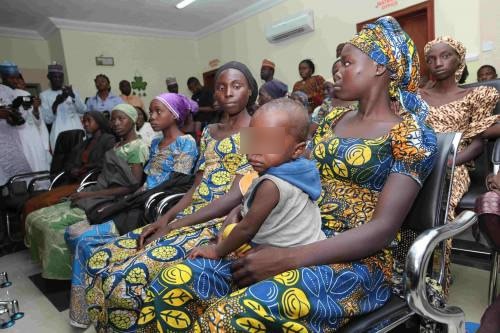On Thursday evening, Osinbajo led some top government officials to visit the girls at the DSS Medical Centre, Airport Road, Abuja, where they are currently receiving medical attention.
Osinbajo, who was accompanied by the Director-General of the DSS, Mr. Lawal Daura; Minister of Information and Culture, Mr. Lai Mohammed; Minister of Women Affairs, Senator Aisha Alhassan; Minister of State, Budget and National Planning, Zaynab Ahmed; and the Special Adviser to the President on Social Protection Plan, Mrs. Maryam Uwais, later briefed State House correspondents at the Presidential Villa, Abuja.
The Vice-President disclosed to journalists that the Federal Government did not swap any Boko Haram detainee for the release of the girls.
“There was no exchange of any kind. There was no swap of any kind. Even when we started negotiations, we said we would consider all options available to us. Absolutely, there was no exchange of any kind,” he said.
When asked if the government would consider a swap for the release of the remaining girls still in captivity, Osinbajo said the government would look at all options and weigh them carefully.
“In doing so, however, the security and safety of the country would be considered,” he said.
He said the government would rather use the same template that was used for the release of the 21 girls to secure the release of the remaining ones.
Osinbajo said, “We must be sensitive to the fact that the government wants these girls back and alive. Again, we must balance this against the security and safety of the country.
“In the process of negotiation, we will look at all options and we will weigh the options carefully and decide what to do.
“But what has happened and the process we have begun is one which has not involved any type of swap of Boko Haram commanders or any militant in any way.
“That is a very good turn of event. We believe that in the next few days and months, we will be bringing in more of these girls using exactly the same kind of negotiation and the same template that we used.”
Osinbajo also explained that the International Red Cross did not take part in the negotiations but was involved in the process of bringing the girls back because the government needed the organisation’s medical expertise.
“The Swiss government worked with us in the process of negotiation, but the Red Cross is not involved in the negotiation.
“But in taking the girls back, of course, we worked with the Red Cross because we were unable to take our own medical team.
“The Red Cross was not involved at all in the process of negotiation. It was the Swiss government, our own officials such as the DSS, intelligence and the military,” he said.
The vice-president also said only one of the 21 released girls had a baby.
He said the girls were in good health, considering the circumstances in which they lived in captivity.
He said they would continue to receive medical attention while their parents would join them on Friday.
Osinbajo said, “About an hour ago, I met with the 21 Chibok girls who have been brought back and they are in good health, considering the circumstances they have been held in and they are now being well taken care of in a medical facility.
“They will be staying there for sometime until we are satisfied about their health. Their parents will be coming to join them, hopefully by tomorrow (Friday).
“There will be therapy, there will be counselling. Of course, we can imagine what they have gone through. So, we expect that a lot of psychological therapy and so much needs to be done to get them back.”
Earlier at the DSS Medical Centre, the DSS boss did a roll call of the released girls before the Vice-President.
He thereafter presented the list to Osinbajo as part of the handing over of the girls.














No comments :
Post a Comment